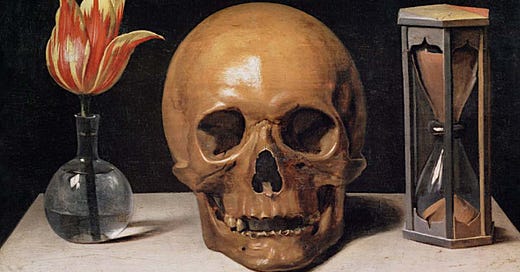Forever 27
Let’s workshop this poem about a man's blindness both for his future self (who must deal with the repercussions of his present choices) and for his death date (which has the power to defang regret).
scent of the day: Jaipur Homme EDP, by Boucheron (a powdery-creamy-spicey flashback to the oriental perfumery of the 90s; reminiscent, to my nose, of one of my first perfumes: the much-later Naxos by Xerjoff)
Forever 27
He could not focus
empathic eyes to the future
self that must face
the reflected fallout
from his rock’n’roll
(the career-cremating
neck tat of a girl's name,
“Q’Riah”) let alone
eyes to the void
that, racing at him,
has long proven psychic
iodine for regret radiation.






"Forever 27" reflects on the destructive mythos of rock stardom, often characterized by the tragic deaths of young musicians at the age of 27, such as Jimi Hendrix, Janis Joplin, Kurt Cobain, and Amy Winehouse. The poem delves into themes of youthful immortality, the consequences of impulsive decisions, and the inescapable void that awaits. The title itself is a direct allusion to the "27 Club," the cultural phenomenon surrounding the numerous rock stars who died at that fateful age, suggesting that the subject of the poem is one who lives recklessly, without the foresight to realize the consequences of his actions.
The opening lines present a figure who lacks the ability to "focus empathic eyes to the future," indicating a psychological and emotional blindness. The use of the word "empathic" suggests that this is not just a failure to look ahead for personal reasons but an inability to connect with the future consequences of his actions on others. The poem positions this inability as tragic, especially when set against the backdrop of "rock’n’roll," a genre long associated with rebellion, excess, and the rejection of conventional responsibilities.
The poem highlights the physical symbol of this recklessness in the form of a "neck tat of a girl's name, 'Q'Riah,'" which carries career-destroying implications. The neck tattoo serves as a concrete manifestation of impulsiveness and disregard for the consequences. In the music industry, particularly in rock’n’roll, such a tattoo may be seen as an act of defiance or branding, yet here it is framed as "career-cremating," linking it to a self-destructive act that burns bridges rather than builds them.
The poem then shifts its gaze to the future—or more precisely, the absence of one. The speaker seems to struggle to "focus empathic eyes" not just on his career but on the "void" racing toward him. This void represents both the physical inevitability of death and the psychic burden of regrets that accumulate over a life lived too fast. The "void" is depicted as a force that has "long proven psychic iodine to regret radiation." This metaphor suggests that, just as iodine protects against radiation exposure, the looming void dulls the burn of regret. In this way, the poem illustrates the paradoxical relationship between living with abandon and the underlying awareness of mortality: the character is simultaneously drawn to and numbed by his impending demise, as if the thrill of danger acts as a shield against confronting his mistakes.
Ultimately, the poem engages with the trope of the doomed artist, whose refusal to acknowledge the long-term ramifications of his actions leads him down a path of inevitable self-destruction. The imagery of tattoos, rock’n’roll, and the "racing" void conjure a world where time is compressed and actions are irreversible. In this world, youthful mistakes become permanent scars, both literally and metaphorically, with the figure in the poem embodying the perpetual present of someone who will never grow old—who remains, in the cultural imagination, "forever 27."
The tension between fleeting fame and eternal regret, between the rush of reckless choices and the inescapable approach of the void, makes "Forever 27" a meditation on the dangers of living solely for the moment without regard for the future. It serves as a cautionary tale of a life arrested at the peak of its wildness, where the inability to "focus" on anything beyond the now ultimately seals one's fate.
27 Club, rock’n’roll myth, impulsiveness, mortality, regret, neck tattoo, doomed artist, rock stardom, youthful immortality, self-destruction, racing void, psychic numbing, cultural myth, rebellion, career-ending decisions.